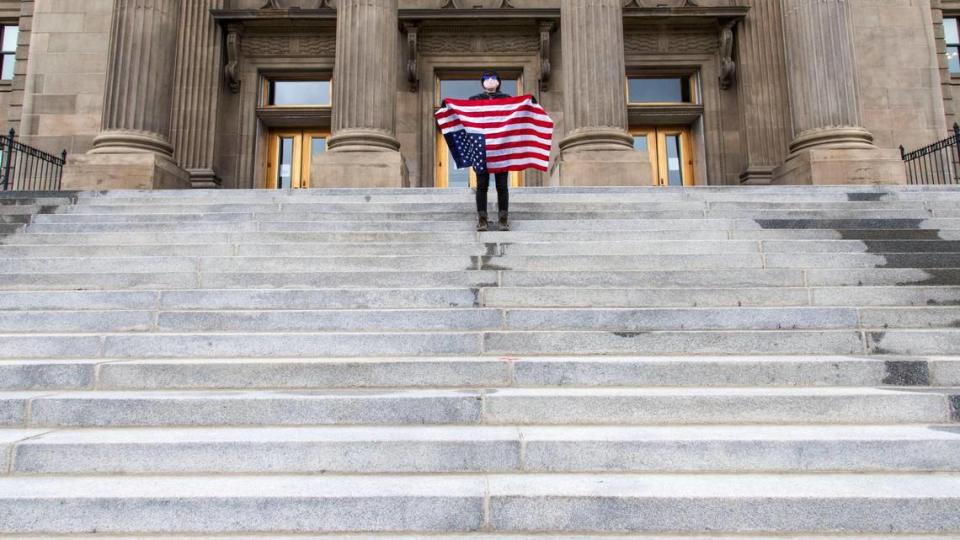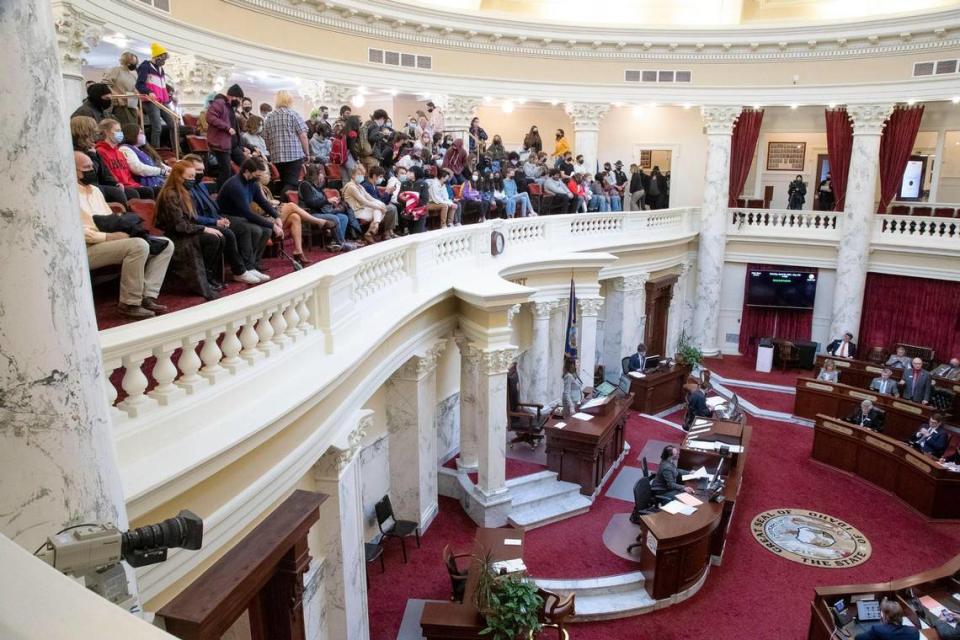Idaho Legislature fast-tracks ‘critical race theory’ bill despite student protests
- Oops!Something went wrong.Please try again later.
With backpacks still on and posters in hand, dozens of high school and college students arrived in front of the Idaho Capitol Monday afternoon to protest a bill against “critical race theory” that was already set to pass.
Senators on Monday in a 27-8 vote approved the bill, which was crafted to placate legislators who said schools were indoctrinating students and struck down mandated education budget bills. The bill was fast-tracked for a vote on the Senate floor shortly after the public hearing, where speakers overwhelmingly opposed the measure.
House Bill 377 would censor certain discussions about race in classrooms, prohibiting state funding to schools that would “compel” students to believe controversial aspects of “critical race theory.”
The bill does not define critical race theory. Critical race theory “recognizes that racism is not a bygone relic of the past,” according to the American Bar Association’s website. “Instead, it acknowledges that the legacy of slavery, segregation, and the imposition of second-class citizenship on Black Americans and other people of color continue to permeate the social fabric of this nation.”
The association says the theory “cannot be confined to a static and narrow definition but is considered to be an evolving and malleable practice.”
Under the new law, public schools would not be allowed to “compel” students to believe that members of a certain race “are inherently responsible for actions committed in the past” by members of that same race.
The new section of the Idaho code states that tenets of “critical race theory” divide people and are “contrary to the unity of the nation and the well-being of the state of Idaho.”
Critics said the bill would have a chilling effect on teaching controversial topics. Proponents in the Idaho Legislature gave examples of white students feeling uncomfortable about disagreeing with what’s being taught. They said it would facilitate freedom of thought.
Students say they want to learn about racism in schools
Rep. Barbara Ehardt, R-Idaho Falls, during a debate on the House floor earlier this week, said students are being taught to “hate their country” in reference to discussions about racism.
On the Idaho Capitol steps, Yvonne Shen, 13-year-old organizer of the Asian American Pacific Islander Youth Alliance, said being taught the country’s complete history, the good and the bad, is not about “self-hatred.” Rather, it’s an important step to being able to correct those wrongs, Yvonne said.
“Make no mistake, this is self-awareness,” Yvonne said. “If we aren’t able to recognize our own flaws, we will never be able to progress beyond them.”

The demonstration outside the Idaho Capitol drew dozens of students, many of whom rushed to the Statehouse to try to testify against House Bill 377. The hearing was initially scheduled for 3 p.m. but was moved up to 1:30 on Monday. Testimony was cut short to vote on the bill and send it to the Senate floor.
Wency Sou, a Boise High School sophomore and AAPI Youth Alliance organizer, said she felt like Idaho’s education system glosses over institutional racism.
Wency said she’s had to do much of her own research to educate herself over the past year. Sou listed protests against racial injustice that broke out across the U.S. last summer over the killing of George Floyd, and the discrimination Asian Americans faced over the coronavirus pandemic as a motivation to educate herself.
Selena Sanchez, a 20-year-old Boise State University, said she grew up facing discrimination in Coeur d’Alene because she’s Mexican American. Sanchez said she believes the measure seeks to silence minorities in the state.
“This is censorship,” Sanchez said. “We should all be afraid.”
Idaho senators pass bill mostly along party lines
Students filled the gallery in time to see the vote on the bill Monday.

Sen. Carl Crabtree, R-Grangeville, said the bill reflected negotiation with House members to address concerns over social justice teachings in the educational system.
“This bill does not intend to prohibit discussion in an open and free way,” said Crabtree, who chairs the education committee and sponsored the bill in the Senate. “It is a preventive measure. It does not indicate that we’ve got some rampant problem in Idaho, but we don’t want to get one.”
House members in the past shot down three major education budgets over concerns about social-justice teachings.
In new versions of major education budgets, higher education institutions would see a $2.5 million cut. Legislators approved the new bills in a Joint Finance-Appropriations Committee on Tuesday morning. More money was put into K-12 teacher salaries. Those bills will still need to be voted on by the House and Senate.
Rep. Julianne Young, R-Blackfoot, who co-sponsored the bill, told Senate Education Committee members on Monday that the critical race theory bill was a response to concerns over a proposed federal rule.
Democratic President Joe Biden’s proposed rules say that a “national reckoning with systemic racism have highlighted the urgency of improving racial equity throughout our society, including in our education system.”
Senate Minority Caucus Chair Janie Ward-Engelking, D-Boise, who was a teacher for over 30 years, said that if students were being indoctrinated, Idaho wouldn’t be one of the reddest states in the country.
“I just think this is kind of like the boogeyman that’s under our children’s bed,” Ward-Engelking said. “And it may seem scary to him or her, but it’s not real.”
Sen. Melissa Wintrow, D-Boise, said discussions about racism and sexism can be uncomfortable but are “absolutely necessary.”
“For every complaint from a white student who felt uncomfortable in a discussion, I have a pocketful of discrimination claims from women and people of color from my institutions,” said Wintrow, who taught in universities. “And I’ve helped those students file complaints. I have never once seen an entire program or a class close down because of it.”
Sen. Dan Johnson, R-Lewiston, the lone Republican with a “no” vote, said he opposed the bill because of the method in which it was passed. He also said he didn’t want the bill to “give life” to critical race theory by including reference to it.
“I’m more concerned with the path we took to get here,” Johnson said. “I think we’re setting a precedent for next year and future sessions going down this road.”

